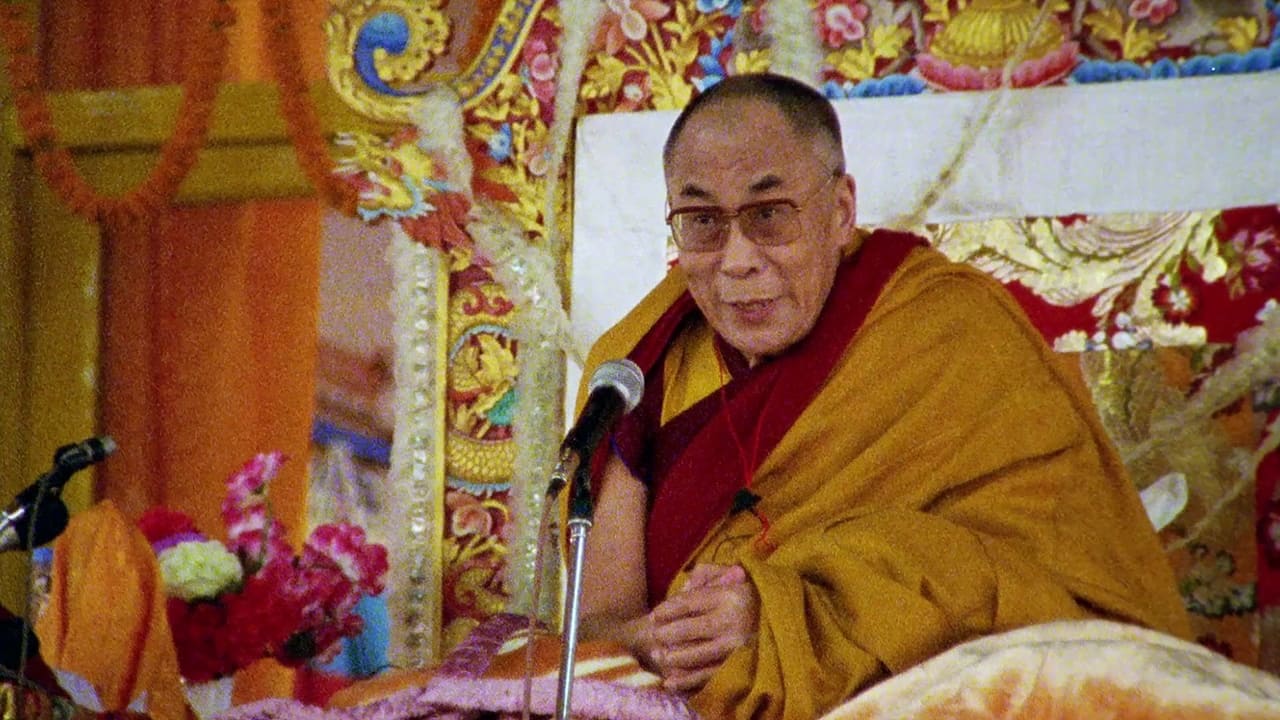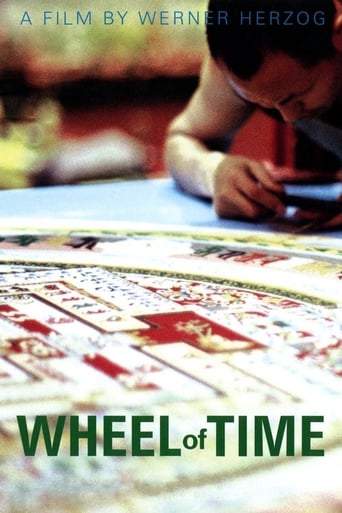

What is it about middle aged white mean and their sudden love of Orientalism (or jazz, for that matter)? Is it a midlife crisis? This thought came to me watching Werner Herzog's 2003 documentary Wheel Of Time. The best thing I can say of the film is that it would make for a solid PBS film by a typical documentary director, but coming from a master of cinema, like Herzog, it's a profound disappointment. Why? There simply is nothing more to this film than Herzog filming the mundane goings on at a trio of Buddhist festivals in 2002, and acting as if peasants trekking about a mountain (Mount Kailash in Tibet), monks painting mandalas with colored sand, and white Austrians rapt with Orientalism, were supposed to lend some deep insight into the cosmic goings on. At least, that is what can be taken from Herzog's narration of the film.Too often the film is hermetic; its rituals are regarded, but no explanation is proffered, not from an anthropological nor narrative perspective. The acts of prostration, as example, become mere sideshow carny acts to the watcher of this film, and never impart any sense of admiration for the devotees, because they are unreal, in many ways, never fully part of the vital reality of the film. Similarly, we see children in monk robes, yet Herzog never queries how such children really feel about being drafted into their family's business, something I once asked a young Buddhist monk. All in all, Wheel Of Time is a solid film, fairly straight forward, and nothing remotely approaching his earlier, greater films. Perhaps the most telling thing is that Werner Herzog made a merely solid film; that's how damned good a film craftsman he is. No, I'm wrong; even worse than making a solid film is the fact that the faux reverential Herzog mad a non-Herzogian film. Let's just hope Herzog is never smitten with John Coltrane nor Charlie Parker. That would not be merely solid, but brutally painful. Goodbye, Dalai!
... View MoreWerner Herzog again.This time he is in his mode of creation more by discovery than invention, and it pays off.The raw material is striking by itself: vast numbers, ephemeral yearnings, trivial and essential rituals. Devotion in any endeavor is something we are drawn to, and there is plenty for our filmmaker to harvest.The essential part of this film is Herzog as camera during a gathering in India, where a variety of consecrations are planned. Monks and devotees come, some by difficult and humbling means. 400,000 faces (all attempting calmness) are miraculously organized, assembled to be led by the supreme priest.We see queues so orderly they could only exist among such beings, but anxious chaos when fighting for tossed goodies: dumplings and candies. We have zealots, order and peace.Into this sails Herzog. The story is that he had been cajoled into filming the much smaller gathering in Austria. Austria! He was reluctant to do so, and after the film remains firm in his belief that Austrian Buddhists don't make much sense to him. But with this commitment, he traveled to the gathering in a sacred place in India near Nepal.There he found a focus for his film in one of the rituals. Though it is presented as central to the gathering, it is only so in Herzog's vision. This holds that mysteries can be conveyed visually. The situation needs to support the vision, but the vision is the thing. It is not the symbol, the notation, the token, but the real thing. This is how he thinks of cinema and the way he presents the sand mandala carries this import.The "Wheel of Time" is one translation of a sand painting made for this type of gathering, as perfected and maintained by one of the groups in Tibet. Mandalas are movies and intended for meditation, as a structure existing between and shared by the mind of insight and the real world of color and structure. There is much to be said of them and cinema, but Herzog only could film this one (and its copy in Austria) as it is being made with colored sand and exhibited as devotees are rushed past it.He then went to Mount Kailash, Though this is a couple hundred miles away, he merges it seamlessly into the gathering of nearly half a million robed prayers. Here, he is able to make some magnificent images of the mountain, its waterways and the people ritualistically circumnavigating it. This is holiness he understands and the conflation of mountain and mandala works. As usual, the music adds great power. I believe that henceforth, I will associate that music with this devotion, though there is no relation other than Herzog chose to build his mandala of these sounds, this extract of natural rock and water, and these people. They would not recognize their devotions as shown here. (And some of this is staged.) But for me, it is a window into something more holy than they worship.Ted's Evaluation -- 3 of 3: Worth watching.
... View MoreWheel of Time is a curious documentary crucially because of someone from the West, like myself, being privy to traditional customs and ceremonial practices that seem like they could be coming from another world. But, as one soon learns, this curiosity is strong because it IS apart of this world, and maybe the truest moment of clarity from the Dalai Lama himself comes when he states how the universe is really not owned by one country or apart of one mountain or other, but is in how an individual conceives it- the universe, the center of it, is in you, or at least your projection of what it is, which is not something collective but ultimately is. It's a very wise statement that will keep me pondering it over for a long time. Likewise, the Kalachakra mandala becomes like a metaphor for this ideal, of hundreds of thousands of people coming together for the purpose of- aside from getting priceless words from the Dalai Lama- being at inner peace with oneself, hence the universe.By the end of Wheel of Time I didn't know much more about Buddhism than I had going into it, which isn't any real fault on Herzog's end as a filmmaker; it doesn't illuminate and challenge the mind too much like other documentaries of the filmmaker, but it's also nevertheless unique in Herzog's cannon for what he does and doesn't take on with his subject(s). On the one hand, he's endlessly fascinated with ritual, with physical movements, of the masses of people who have gone on this pilgrimage from thousands of miles from all over the continent for this once-in-two-years event (this adds a dosage of climactic irony for what happens there- an 'illness'). It's anthropological to an extent, only it's not one of everyday culture so much as the unheeding devotion to a religion based around enlightenment, not suffering via a messiah or other. On the other hand, Herzog relies this time on just being a guy with a camera, moving around these swarms of people, and this time Herzog relents for the most part to "directing landscapes" as he usually does to just catching people's faces, their body language, and the instruments at their disposal (which are, usually, their own bodies, as in their bowing-type moves to attain a level, and crawling on ones hands and face across land for a purpose). It's actually, for Herzog, kind of conventional, bordering on being something one might expect for television.But this little note shouldn't discourage one from seeing the film, and whether you're a Buddhist or not it holds its own aura that provides moments almost akin to what the Dalai Lama wants for his pupils and followers. One's even reminded of Woodstock in comparison of a documentary that goes out of its way to show more-so the nature of the people who gather together, and the power of a gathering, than the actual acts themselves. On top of this, Herzog does the occasional focus on an individual (albeit a little sidetracked as it is during the climax) with a political prisoner released from China and allowed to finally "see" the Dalai Lama in person. And for Herzog fans who are always on the prowl for his 'adequate images', there's still a good few to go around here, like when he captures the mountains that the Tibetans go to in masses, or the final images, including one that is as haunting as anything Herzog's shot. It's a peaceful, brisk journey; not a great work, but not an insignificant one either.
... View MoreI just saw Wheel of Time yesterday at its premiere in Toronto, where Herzog was present. As usual, Herzog creates a compelling film: a portrait of a traditional Bhuddist initiation ceremony. Specifically, we are shown the pilgrimmage of hundreds of thousands of people to India and one year later, to a similar ceremony in Austria. On a purely documentary level, this winning film is a fascinating piece, giving insight into this ancient ceremony (including the pilgrimmage itself), as well as showing us the painstaking construction of a large "mandala" made out of colored sand, with a "wheel of time" intricately designed in its center. The interviews with the Dalai Lama were interesting and even humorous. On an artistic level, it is also a winner, as Herzog mixes stylistic poses and environmental landscapes within the structure of the documentary. Of course, Herzog's critics call this self-indulgence, but I strongly disagree. Herzog operates on a subconcious level in most of his films, including his narrative features, and actually succeeds where other "artsy" filmmakers fail miserably. Herzog has produced yet another fascinating masterpiece.
... View More